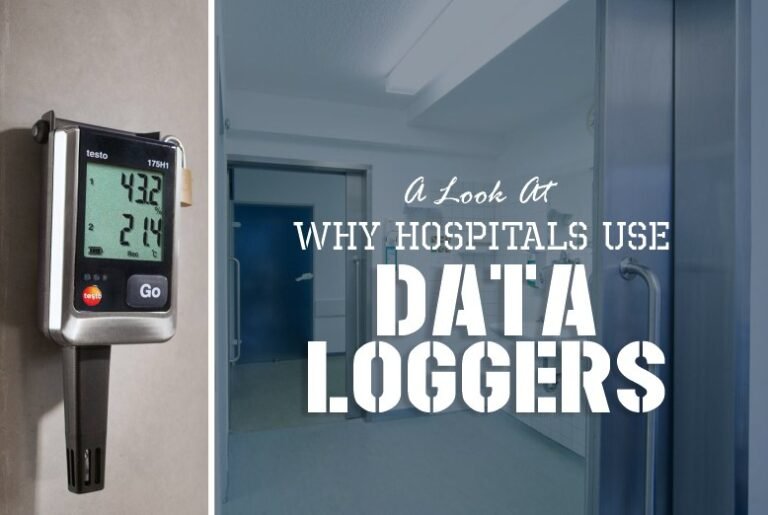Data loggers are essential, small electronic devices used by the entire pharmaceutical industry. In addition, hospitals use them frequently in similar ways to the rest of the industry to help with data tracking and minimize potential environmental contamination issues.
These devices have quickly overtaken old methods, largely thanks to the COVID-19 pandemic. Increasingly, they are replacing the older electromagnetic chart recorders that originated in the early 19th century. While they are not limited to being used in the healthcare industry, data loggers have had one of the most significant impacts.
What a Data Logger Does in the Hospital
Data Loggers are small devices with sensors used to collect and provide data to monitor storage areas of products, establish compliance with regulations, and potentially reveal hidden environmental problems. Hospitals often utilize data loggers in locations where sensitive materials are stored. A variety of data loggers best suited for refrigerated, dry, or sterile environments are often used in hospitals to ensure that nothing is at risk of contamination or going bad.
They help with the regulation of the sensitive environments within the hospital. For example, these areas can use the types of data loggers best suited for operating rooms or low-temperature storage areas to ensure the spaces stay regulated.
Importance of Data Loggers in Healthcare
It’s no surprise that the healthcare industry needs fast and reliable data about the environmental conditions within a hospital. Contaminants and sensitive materials that must remain sterile are common within these buildings and must remain separate.
As a result, hospitals have strict guidelines and regulations for handling treatments, drugs, and other pharmaceutical materials. Data loggers help adhere to these guidelines by giving a consistent method to track data.
They require minimal human interaction to gather data, making them perfect for sensitive storage areas. Aside from general mechanical check-ups, when placing a data logger in an environment, it can operate autonomously for extended periods. Of course, it is necessary to perform occasional human check-ups to ensure nothing is wrong with the data loggers or to recalibrate them. Still, they greatly ease the data-gathering process and reduce the risk of human error.
Data Loggers and Hospital Protocols
The types of data loggers hospitals often use are also employed to help provide proof of adherence to all regulations and protocols. Therefore, preventing a gap in the hospital’s data due to human error and quick access to data.
When these areas fall out of the expected regulations imposed on them, the data loggers make catching these irregularities and acting upon them a quick and easy process. In addition, data loggers are necessary to ensure correcting any problems before causing any damage within the hospital.
A data logger has the added benefit of protecting the hospital’s reputation. With firm data backing up the safety of the hospital and its products, people can clearly understand the elements of hospital management. Data is quickly becoming a critical part of helping maintain a reputation in the modern area, and data loggers are the best way to gather it properly without human error.
Types of Data Loggers
With the influx of data that hospitals can acquire, they can act fast and keep track of any storage problems that arise, but it’s not best for them to use a single type of data logger. Different data loggers exist for different environments and gather different data types. Knowing which is best for a specific location is paramount to ensuring that the devices work without significant risk of failure.
There are several types of data loggers a hospital can use. Below, we explore some of them in slightly more detail.
Temperature Data Loggers
In hospitals, storage areas often need to maintain specific temperature ranges to ensure that no pharmaceutical products are at risk. The types of data loggers available utilize temperature data loggers for these applications.
As the name suggests, temperature data loggers measure and record the temperature data of the stationed area over a set period. Most use either thermocouples or thermistors.
Certain medications, such as vaccines and boosters, may require low temperatures of a specific narrow range to prevent them from degenerating. The temperature logger can keep track of the temperature ranges where storing these vaccines and send alerts if it detects that they are at risk.
Pressure Data Loggers
Many data loggers can help prevent room contamination. For this reason, a pressure data logger is one type available in hospital operating rooms.
Pressure data loggers can detect potential negative pressure differentials between the operating room and other rooms when used in a hospital room. If the conditions are suitable for drawing in contaminated air, it can help prevent a patient from being put into a dangerous situation.
Humidity Data Loggers
The humidity data logger used in hospitals worth reviewing is the last standard data logger. Like temperature data loggers, they track environmental conditions in the healthcare industry to prevent contamination. In addition, they use sensors to detect humidity or moisture in the air that could potentially damage medical products or equipment.
Inside hospital settings, humidity data loggers are used to monitor the humidity levels of cleanrooms and labs. They are often used alongside other data loggers, such as temperature monitors, to ensure no contamination will impact sensitive materials. Therefore, helping keep delicate treatments, like vaccines, from degrading to the point of required disposal.
ALSO READ: Easy And Healthy Solutions To Cut Down Healthcare Expenses



